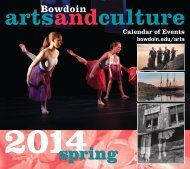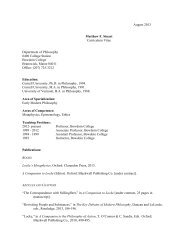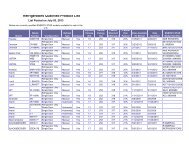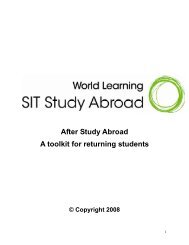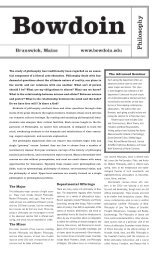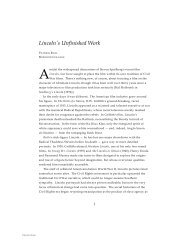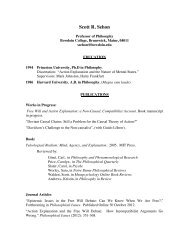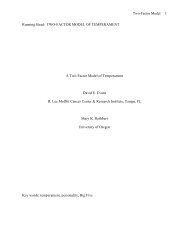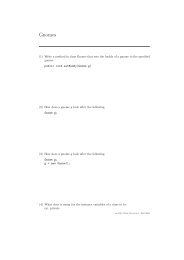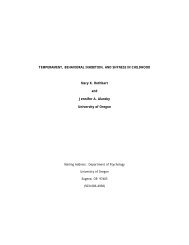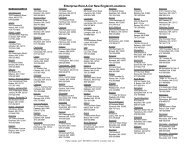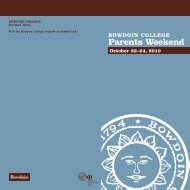Syllabus [ PDF ] - Bowdoin College
Syllabus [ PDF ] - Bowdoin College
Syllabus [ PDF ] - Bowdoin College
Create successful ePaper yourself
Turn your PDF publications into a flip-book with our unique Google optimized e-Paper software.
Free Radicals and Antioxidants<br />
Biology 306<br />
Professor Barry Logan<br />
Meeting time: Monday and Wednesday: 11:30 - 12:55<br />
Location: Druckenmiller 004<br />
Barry Logan’s contact information:<br />
Office: 220A<br />
Phone: 725-3944<br />
e-mail: blogan@bowdoin.edu<br />
Prerequisites: Any 200-level course in Biology<br />
Textbook: Free Radicals in Biology and Medicine (4 th ed.) Halliwell & Gutteridge<br />
This text is the standard-bearer of the discipline. Halliwell and Gutteridge are excellent writers<br />
and I find the book readable, but the depth and breadth of material are evermore challenging<br />
(consider this a symptom of our growing appreciation for the importance of this topic). Read the<br />
text; it will facilitate classroom discussions.<br />
Course philosophy:<br />
I intend for this course to be part an introduction to oxidative stress, part a survey of its relevance<br />
in diverse biological systems, part hands on (with some practical lab advice thrown in), and part<br />
graduate school-like seminar. During the semester I will lecture, we will perform experiments,<br />
and you will lead discussions. Regardless of the format of a given day, I expect it to be entirely<br />
interactive. Speak up and get involved.
Free Radicals and Antioxidants – Biology 306<br />
<strong>Syllabus</strong><br />
Date Topic Reading 1<br />
Jan. 21 Introduction & Chemistry of Reactive Oxygen Species (ROS). 1<br />
23 The Chemistry of ROS & The Cellular Damage They Cause 2<br />
28 ROS Damage & Diet-Derived Antioxidants 4.8-4.14; 3.1, 3.20-3.22<br />
30 Diet-Derived Antioxidants & The French Paradox 3.20-3.22<br />
Feb. 4 Experiment: The Scavenging Capacity of Red Wine<br />
6 Methods of Detecting ROS 5<br />
11 Enzymatic Antioxidants 3.2-3.9<br />
13 Enzymatic Antioxidants 3.2-3.14<br />
18 ROS and Signal Transduction 4.5<br />
20 Beneficial Aspects of Oxidative Metabolism 7<br />
25 Mid-Term Exam<br />
27 Cancer 9.13-9.15<br />
March 3 Cancer & The CARET Study 9.13-9.15, 8.12<br />
5 Aging 10<br />
24 Aging 10<br />
26 Discussion of Garry Buettner’s Research<br />
27 – 4PM Seminar by Garry Buettner [Note: This is outside of our scheduled meeting time]<br />
31 Malaria and ‘Inborn Errors of Metabolism’ 6.6<br />
April 2 Malaria and ‘Inborn Errors of Metabolism’ 6.6<br />
7 Student Talks on ROS and Disease<br />
9 Student Talks on ROS and Disease<br />
14 Student Talks on ROS and Disease<br />
16 Student Talks on ROS and Disease<br />
21 Student Talks on ROS and Disease<br />
23 Plants and Light: Managing Too Much of a Good Thing<br />
28 Plants and Light: Managing Too Much of a Good Thing<br />
30 HPLC Analysis of Plant Carotenoid Composition<br />
May 5 HPLC Analysis of Plant Carotenoid Composition<br />
7 Megavitamin Supplements & Wrap-up<br />
1 These readings will be supplemented by materials from the primary and review literature.
Grading<br />
Your grade will be determined based upon the following:<br />
Mid-Term Exam 30%<br />
Final Exam 15%<br />
Analysis and Presentation of Experimental<br />
Data<br />
2 X 5%<br />
Presentation on ROS and Disease 25%<br />
Paper on ROS and Disease 20%<br />
Participation and Involvement The “X” Factor<br />
The Academic Honor Code [excerpted from the Student Handbook]<br />
The success of the Academic Honor Code requires the active commitment of the <strong>College</strong> community. <strong>Bowdoin</strong><br />
<strong>College</strong> expects its students to be responsible for their behavior on and off the campus and to assure the same<br />
behavior of their guests. Uncompromised intellectual inquiry lies at the heart of a liberal education. Integrity is<br />
essential in creating an academic environment dedicated to the development of independent modes of learning,<br />
analysis, judgment, and expression. Academic dishonesty, in or out of the classroom, is antithetical to the <strong>College</strong>’s<br />
institutional values and constitutes a violation of the Honor Code. The Academic Honor Code plays a central role<br />
in the intellectual life at <strong>Bowdoin</strong> <strong>College</strong>. Students and faculty are obligated to ensure its success.<br />
III. Proscribed Conduct<br />
The following sections describe activities constituting breaches of the Academic Honor Code.<br />
1. "Academic Dishonesty" includes but is not limited to (1) the receiving, giving, or using of any assistance on<br />
quizzes, tests, written assignments, examinations or laboratory assignments; (2) references to sources beyond those<br />
authorized by the instructor in preparing papers, constructing reports, solving problems, or carrying out other<br />
academic assignments; (3) inadequate citation of sources; (4) acquisition, without permission, of tests, computer<br />
files or similar material which would give the student an unfair advantage on an assignment or examination; (5)<br />
submission of academic work not a student’s own original effort; (6) use of the same work for multiple courses<br />
without prior knowledge of the receiving instructors; (7) depriving learners of access, including computer access, to<br />
library information through intentional monopolization, mutilation, defacing, unauthorized removal of books or<br />
other materials from <strong>College</strong> libraries, or purposeful failure to return library materials on a timely basis; (8)<br />
unauthorized altering of academic records (transcripts, grading sheets, Course Registration Cards, etc.).<br />
2. A number of <strong>Bowdoin</strong> <strong>College</strong> courses employ various kinds of collaborative assignments in several different<br />
situations, including homework, laboratory reports, and in-class assignments. When preparing such course work,<br />
students should follow the individual instructor’s policy on collaboration. When the instructor permits collaboration<br />
among students, the use of another student’s work or ideas should be credited properly.<br />
3. It is the obligation of students to be thoroughly familiar with proper citation of sources and to consult and refer to<br />
authoritative style guides for research papers. New students will receive a copy of Sources during Orientation.<br />
Students should keep this booklet for reference throughout their years at <strong>Bowdoin</strong>. The <strong>Bowdoin</strong> <strong>College</strong> Library<br />
Web site provides links to style guides at http://www.bowdoin.edu/dept/library/eref/write.html. Students are<br />
particularly encouraged to consult the MLA Style Guides, Sources, and Bibliographic Formats for Citing Electronic<br />
Information. Plagiarism is possible with any work performed in any medium and any scholarly discipline.<br />
Plagiarism involves the use, by paraphrase or direct quotation, of the published or unpublished work of another<br />
person without full and clear acknowledgment in all such scholarly work as essays, examinations, quizzes,<br />
oral/written reports, homework assignments, laboratory reports, computer programs, music scores, choreography,<br />
graphic depictions, and visual representations. Plagiarism also includes the unacknowledged use of materials<br />
prepared by another person or agency engaged in the selling of term papers or other academic materials.


![Syllabus [ PDF ] - Bowdoin College](https://img.yumpu.com/7680023/1/500x640/syllabus-pdf-bowdoin-college.jpg)
